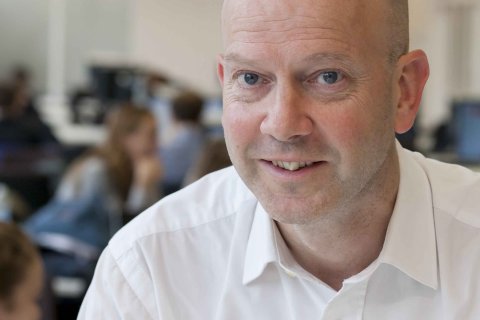More effective communication through practice with a ‘virtual patient’
Coorperation City of Utrecht and Utrecht University
A ‘serious game’ developed at Utrecht University helps health care professionals communicate more effectively with people suffering from complex health problems. The experience of professionals in some Utrecht neighbourhoods has shown that this will help patients receive better care. The game is unique in that it lets the ‘virtual patient’ display emotions. On Tuesday, 3 February, City of Utrecht Alderman for Public Health Victor Everhardt and Anton Pijpers, Vice-President of the Executive Board of Utrecht University signed an agreement for the further development of the game.
The serious game ‘The Virtual Patient’ allows health care professionals to conduct consultations with people who suffer more than average from multiple complex health problems. Professionals in the Utrecht neighbourhood of Overvecht have successfully developed a new approach to deal with this problem. An important aspect of the approach involves a different method for discussing the patient’s personal problems. “The Virtual Patient helps to steer the conversation in such a way that the patient and care professional can uncover the patient’s physical, mental and social problems. This helps the patient receive more effective treatment”, explains Ruth Lenstra, Assistant Practitioner at the general practice De Dame and Ondiep Health Centre.

Unique: emotions and flexibility
The Virtual Patient is unique in that it lets the ‘virtual patient’ react emotionally to questions it is asked. This allows the player to experience a ‘sensory conversation’. “There are other online learning environments to train communication skills, but they often lack the emotional level”, explains Prof. Johan Jeuring, Professor of Software Development for Learning and Teaching at Utrecht University. “Furthermore, the game’s flexible structure offers the opportunity to have longer consultations. The professionals can also enter a consultation scenario based on a real-world case study, so they can share their experiences. That helps speed up the learning process.”
Healthy Utrecht!
The new approach for people with multiple complex problems is part of ‘Utrecht Gezond!’ (Healthy Utrecht!), a cooperative effort between the City of Utrecht and health insurer Achmea. The goal is to identify all of the limitations that a patient experiences, from physical problems to social problems. This brings out the best in the care professionals’ knowledge and expertise, and prevents health risks due to too much or too little treatment. This helps the patient to get back to 100%, which also helps the city have more people who can actively participate in society.
For education and professionals
The Virtual Patient is based on the game ‘Communicate!’, which was developed by students at Utrecht University. “Building skills requires training, but organising and supervising training sessions takes time. A game is an efficient way to support skills training efforts for education as well as for professionals”, says Jeuring.
Educate-it
Communicate!, the serious game on which The Virtual Patient was based, is an example of an innovation project within the university-wide programme Educate-it. This programme encourages and supports lecturers in their teaching innovation efforts and making it more ‘blended’. Educate-it offers technical and didactic support for the introduction of E-lectures, E-assessments, ELO and educational innovation projects. Lecturers who have a good idea for improving the quality of their education using IT tools can submit a request for an innovation project via the Educate-it website. Lecturer professionalization and evaluation, quality assurance and research into the effects of the use of IT in education are the common themes in the programme.
Student Game Project
The development of The Virtual Patient is a collaborative effort by Utrecht care professionals and the Utrecht University Bachelor’s study programme Game Technology. Students must complete a ‘Game Project’; a practical assignment for a real client, in which they form an independent development team. The further development of The Virtual Patient will be carried out by teams of students.
Excellent example of cooperation
“The university’s expertise in the field of game technology contributes to innovation in health care, and our assignment helps contribute to improving the health of Utrecht’s residents. It is an excellent example of how medical practice, the city and the university can work together on a healthy future for Utrecht”, according to Hetty Linden, Director of Public Health at the City of Utrecht.
More information
- About the Utrecht Gezond! Convenant
- Communicate!, the serious game on which The Virtual Patient was based, is an example of the university-wide programme Educate-it, which encourages innovation in education through the use of IT. Communicate! is an innovation project led by Prof. Johan Jeuring, Professor of Software Technology for Learning and Teaching at the Faculty of Science. Professor Jeuring’s research focuses on advanced methods for developing software that supports learning and teaching.
- Utrecht University's Center for Game Research conducts multi-disciplinary research into games, gaming, game technology and gamification.
- The Game Project is part of the Game Technology major at Utrecht University’s Bachelor programme in Computer Science.Contact: Marjan van den Akker.
Contact
Monica van der Garde, Faculty of Science press contact, m.vandergarde@uu.nl, +31 6-13 66 14 38.

